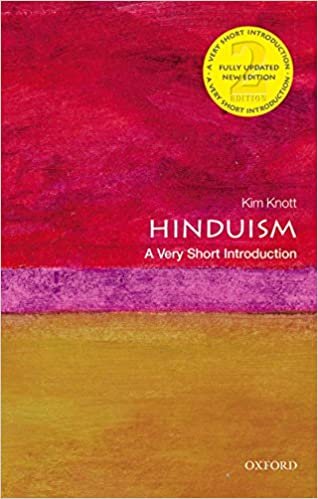
Hinduism
Explore Hinduism
WHAT IS HINDUISM?
Hinduism is the world’s third-largest religion with over 1.25 billion followers, known as Hindus. Roughly 95% of the followers live in India where it originated somewhere between 2300 BC and 1500 BC in the Indus Valley near modern-day Pakistan. Although the religion is considered by many scholars to be the oldest living religion, most Hindus posit that the faith is timeless and has always existed. To that end, many practitioners refer to the religion as Sanatana Dharma (“the Eternal Way”), referring to origins beyond human history. Unlike other religions, there is no one founder and it is a fusion of various beliefs that evolved over time.
Hinduism has no single, systematic approach nor is there a simple set of rules to follow like the Ten Commandments. Rather, local, regional, caste, and community-driven practices influence the interpretation and practice Hindu beliefs throughout the world.
That being said, a common thread among all variations is belief in a Supreme Being and adherence to the following key beliefs:
Truth is eternal - Hindus pursue knowledge and understanding of the Truth: the very essence of the universe and the only Reality. According to the Vedas (ancient Hindu scriptures), Truth is One, but the wise express it in a variety of ways.
Brahman is Truth and Reality - Hindus believe in Brahman as the one true God who is formless, limitless, all-inclusive, and eternal. Brahman is not an abstract concept; it is a real entity that encompasses everything (seen and unseen) in the universe. That being said, Hindus recognize other gods and goddesses as followers believe there are multiple paths to reaching their one god, Brahman.
The Vedas are the ultimate authority - The Vedas are Hindu scriptures that contain revelations received by ancient saints and sages. Hindus believe that the Vedas are without beginning and without end; when everything else in the universe is destroyed (at the end of a cycle of time), the Vedas will remain.
Everyone should strive to achieve dharma - Understanding the concept of dharma helps you understand the Hindu faith. Unfortunately, no single English word adequately covers its meaning. Dharma can be described as right conduct, righteousness, moral law, and duty. Anyone who makes dharma central to one’s life strives to do the right thing, according to one’s duty and abilities, at all times.
Individual souls are immortal - A Hindu believes that the individual soul (atman) is neither created nor destroyed; it has been, it is, and it will be. Actions of the soul while residing in a body require that it reap the consequences of those actions in the next life — the same soul in a different body. The process of movement of the atman from one body to another is known as transmigration. The kind of body the soul inhabits next is determined by karma (actions accumulated in previous lives).
The goal of the individual soul is moksha - Moksha is liberation: the soul’s release from the cycle of death and rebirth. It occurs when the soul unites with Brahman by realizing its true nature. Several paths can lead to this realization and unity: the path of duty, the path of knowledge, and the path of devotion (unconditional surrender to God).
Hinduism and Buddhism have many similarities. Buddhism, in fact, arose out of Hinduism, and both believe in reincarnation, karma and that a life of devotion and honor is a path to salvation and enlightenment.
WHERE DID HINDUISM ORIGINATE?
Roughly 95% of the world’s Hindus live in India, accounting for close to 80% of the Indian population. Other significant populations are found in Nepal (23 million), Bangladesh (15 million) and the Indonesian island of Bali (3.9 million). The majority of the Vietnamese Cham people also follow Hinduism.
While the practice of Hinduism is personal in nature, independent of a physical space, Hindus have erected beautiful temples in major population centers. Accordingly, Hindu worship, which is known as “puja,” can also take place in the Mandir (temple). A Hindu temple is a house of god(s) - a space and structure designed to bring human beings and gods together, infused with symbolism to express the ideas and beliefs of Hinduism. Hindu temples are spiritual destinations for many, as well as landmarks for arts, annual festivals, rite of passage rituals, and community celebrations.
Followers of Hinduism can visit the Mandir any time they please. When Hindus worship at home, many followers have a special shrine dedicated to certain gods and goddesses.
HOW TO PRACTICE HINDUISM
At least five elements have given shape to the Hindu religious tradition and practice: (1) doctrine - studying the Vedas (ancient religious and spiritual texts), (2) practice - ritual behavior and offerings as described below; (3) society - honoring and practicing the traditions within the 4-class caste system comprising Brahmans (priests), Kshatriyas (warriors and nobles), Vaishyas (commoners), and Shudras (servants); (4) story - engaging through stories of divine play and of interactions between gods and humans (Ramayana, Mahabharata, Bhagada Vita); and (5) devotion.
The giving of offerings is an important part of Hindu worship or practice, whether at a home-based shrine or in the temple. It’s a common practice to present gifts, such as flowers or oils, to a god or goddess. Additionally, many Hindus take pilgrimages to other sacred sites in India.
Hindus worship many gods and goddesses in addition to Brahman, who is believed to be the supreme God force present in all things. Some of the most prominent deities include:
Brahma: the god responsible for the creation of the world and all living things
Vishnu: the god that preserves and protects the universe
Shiva: the god that destroys the universe in order to recreate it
Devi: the goddess that fights to restore dharma
Krishna: the god of compassion, tenderness and love
Lakshmi: the goddess of wealth and purity
Saraswati: the goddess of learning
Hindus also observe numerous sacred days, holidays and festivals. Some of the most well-known include:
Diwali: the festival of lights
Navaratri: a celebration of fertility and harvest
Holi: a spring festival
Krishna Janmashtami: a tribute to Krishna’s birthday
Raksha Bandhan: a celebration of the bond between brother and sister
Maha Shivaratri: the great festival of Shiva
WHY PRACTICE HINDUISM?
There are numerous physical and mental benefits to practicing Hinduism. Here are ten:
Balance - Hindus believe everything is made of 4 out of 5 natural elements - earth, water, air and fire, which make up our body too. Any imbalance can lead to bad health so the Hindus try to balance health, body and spirit through yoga, mediation and a clean diet
Dietary Code - Hindus believe in taking care of mind and body, which is optimized when you care for what you eat as food impacts your mood and thoughts. Most Hindus do not eat meat as respect to G-d’s creatures and maintain a code the follows the Doshic code of Tamasic, Rajasic and Sattvic foods
Yogic Code - for Hindus yoga is a spiritual path, not physical. It goes hand in hand with meditation to allow you to achieve a higher spiritual and mental state.
Use of Holy Tulsi - also known as Holy Basil, Tulsi is widely used by Hindis for religious purposes andn has many medicinal benefits. Specifically, it has antimicrobial properties that prolongs longevity and is also used in Hindu homes to treat colds, stomach aches, inflammation and heart problems. Lastly, it is used as a natural bug repellent.
Self-control - this is an important aspect of hindu dharma. Hindus believe the mind and body can be trained to overcome bad behaviors and addiction through regular practice and detachment.
Fasting - a practice common among Hindus based on holy days, moon days and festivals. Studies have shown that intermittent fasting improves the immune system, reduces cancer risks and promotes stem cell regeneration.
Oral Health - the dietary patterns and culture of Hindus, including vegetarianism, has led to reduced tooth decay.
Hygiene and Cleanliness - a strict rule of bathing every day, bathing before visiting temples or performing rituals and the need to wash your hands every time you eat supports optimal hygiene.
Meditation - while the intention by Hindus is to connect with G-d on a spiritual level, meditation can reduce negative thoughts. Anxiety and mental blocks.
The Belief in Karma - Karma plays a critical role in the life of a Hindu whereby you accumulate deeds that determine the destiny of the soul. Each act has its own consequence - whether good or bas. Negative thoughts and action bring suffering, while good thoughts and edds can liberate. With this belief, most Hindus maintain a good flow of energy.
Hinduism Resources
Hinduism Videos
Hinduism Books
Cassie Coleman | Explore the Hindu Religion with its fascinating rituals and history. This book has eye-opening information about Hinduism that will help you to understand the religion, the Gods, beliefs, rituals and how it has evolved over time.
Kim Knott | Hinduism is practised by nearly eighty percent of India's population, and by some seventy million people outside India. In this Very Short Introduction, Kim Knott offers a succinct and authoritative overview of this major religion, and analyses the challenges facing it in the twenty-first century. She discusses key preoccupations of Hinduism such as the centrality of the Veda as religious texts, the role of Brahmins, gurus, and storytellers in the transmission of divine truths, and the cultural and moral importance of epics such as the Ramayana.
Edward Viljoen | The Bhagavad Gita: The Song of God Retold in Simplified English is the latest title in the Essential Wisdom Library. This unique edition of the timeless epic is designed to be accessible for readers without any prior experience of Hinduism. Not simply a translation of the original, Viljoen has simplified and restated the Gita’s complex ideas, so that a first-time reader can fully understand.
Swami Achuthananda | "Religion is the opium of the people," said Karl Marx many centuries ago. For more than a billion people living in India and abroad, Hinduism is the religion and a way of life. In this book Swami Achuthananda cracks open the opium poppy pods, analyzes the causes for euphoria, and comes away with a deeper understanding of the people and their religion.This is a comprehensive book on Hinduism. It tells you why Hindus do the things they do - and don't. Written in a casual style, the book guides you through the fundamentals of the religion.
Hinduism Classes & Learning
Hinduism Through Its Scriptures - Harvard Online Courses
Learn about the rich diversity of Hindu sacred texts – hymns, narratives, philosophical thought – and their interpretations.
Hinduism 101: An Introduction - Universal Class
Welcome to this introductory course on Hinduism. In this course, the student will learn the foundations of one of the oldest religions in the world. From the origins of Hinduism to the writings that shaped its historical development over centuries, non-Hindu students are introduced to a number of rather 'foreign' concepts.
Online Course on Hinduism | The Great Courses Plus
Our guide is the rich collection of Aryan texts known as the Veda, today regarded by Hindus as their most sacred and authoritative scripture.

Have a suggestion for the Hinduism Path?
Submit recommendations for podcasts, videos, websites, newsletters, books, classes, and more.







